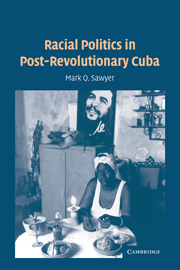Book contents
- Frontmatter
- Contents
- List of Figures and Tables
- Acknowledgments
- Introduction
- 1 Race Cycles, Racial Hierarchy, and Inclusionary Discrimination: A Dynamic Approach
- 2 Freedom and Discrimination: Uneven Inequality and Inclusion in Pre-Revolutionary Cuba
- 3 Race and Revolution: Transformation and Continuity
- 4 Match Made in Heaven or Strange Bedfellows? Black Radicals in Castro's Cuba
- 5 Race and Daily Life in Cuba During the Special Period: Part I: Interview Data
- 6 Race and Daily Life in Cuba During the Special Period: Part Ⅱ: Survey Research
- 7 Racial Politics in Miami: Ninety Miles and a World Away
- Conclusion
- Bibliography
- Index
Introduction
Published online by Cambridge University Press: 05 September 2012
- Frontmatter
- Contents
- List of Figures and Tables
- Acknowledgments
- Introduction
- 1 Race Cycles, Racial Hierarchy, and Inclusionary Discrimination: A Dynamic Approach
- 2 Freedom and Discrimination: Uneven Inequality and Inclusion in Pre-Revolutionary Cuba
- 3 Race and Revolution: Transformation and Continuity
- 4 Match Made in Heaven or Strange Bedfellows? Black Radicals in Castro's Cuba
- 5 Race and Daily Life in Cuba During the Special Period: Part I: Interview Data
- 6 Race and Daily Life in Cuba During the Special Period: Part Ⅱ: Survey Research
- 7 Racial Politics in Miami: Ninety Miles and a World Away
- Conclusion
- Bibliography
- Index
Summary
In 1997, I stepped off a Cubana Airlines plane in Havana, having to that point experienced the mystery of modern Cuba only as a prospective researcher and tourist. There were several other Americans on the flight. We stood in a queue waiting to enter the country. When I arrived at the Customs check, the officer took my passport and motioned me to a side room. Two black Cuban guards moved to my sides and escorted me into an area with a small metal table and a chair.
In the room, they first patted me down and then asked me to sit. My ear had not yet attuned to Cuban Spanish, so my responses were quite slow. First, they asked me where I was from. I responded, “The United States” and showed them my papers. Unsatisfied, they asked, “Where are you really from?” I became annoyed and thought I should get more specific. “Chicago,” I replied. They did not seem satisfied and countered, “But where were you born?” By this time, I was deeply confused and unclear as to how to respond. I replied, “Chicago.”
They looked at each other and seemed to agree on the next question: “Where are your parents from – where were they born?” I responded, “Chicago and Alabama, the United States.” At this point, they seemed confused. One took a second look, and said with relief, “So you're not Cuban?” I responded, “No.” The other then asked, “Not your family? But you look Cuban.”
- Type
- Chapter
- Information
- Racial Politics in Post-Revolutionary Cuba , pp. xv - xxiiPublisher: Cambridge University PressPrint publication year: 2005

